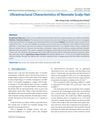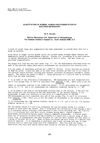 December 2021 in “International Journal of Biomedicine”
December 2021 in “International Journal of Biomedicine” Hyperprolactinemia should be treated before confirming a PCOS diagnosis.
 April 2021 in “Journal of Investigative Dermatology”
April 2021 in “Journal of Investigative Dermatology” A trial showed that a new treatment is safe and effective for male pattern baldness, with most participants growing new hair.
February 2021 in “International journal of agriculture & biology/International journal of agriculture and biology” Wool traits in sheep are controlled by many genes and environmental factors.
 December 2020 in “International journal of research in ayurveda and pharmacy”
December 2020 in “International journal of research in ayurveda and pharmacy” Eating well and avoiding synthetic hair products are key for healthy hair.
 November 2020 in “bioRxiv (Cold Spring Harbor Laboratory)”
November 2020 in “bioRxiv (Cold Spring Harbor Laboratory)” Ezh2 controls skin development by balancing signals for dermal and epidermal growth.
 November 2020 in “bioRxiv (Cold Spring Harbor Laboratory)”
November 2020 in “bioRxiv (Cold Spring Harbor Laboratory)” Dermal EZH2 controls skin cell growth and differentiation in mice.

Hidradenitis Suppurativa has genetic links, with certain gene mutations more common in patients and a third of cases having a family history.
 January 2020 in “Journal of dermatology research and therapy”
January 2020 in “Journal of dermatology research and therapy” Most over-the-counter hair loss treatments lack strong evidence of effectiveness but cost nearly as much as the proven treatment, minoxidil.

New treatments for hair loss show promise, including plasma, stem cells, and hair-stimulating complexes, but more research is needed to fully understand them.
 January 2018 in “Springer eBooks”
January 2018 in “Springer eBooks” Hidradenitis Suppurativa is likely an autoinflammatory disease, and better understanding its causes could improve treatments.
 January 2018 in “Stem cell biology and regenerative medicine”
January 2018 in “Stem cell biology and regenerative medicine” ATP-dependent chromatin remodeling is crucial for skin development and stem cell function.
 April 2017 in “Journal of Investigative Dermatology”
April 2017 in “Journal of Investigative Dermatology” Certain microRNAs may protect against hair loss in alopecia areata and could be potential treatment targets.

The document recommends a multidisciplinary approach and experience sharing to advance facial feminization surgery as a medical field.
 July 2016 in “Indian journal of science and technology”
July 2016 in “Indian journal of science and technology” Neonate scalp hair is thinner, lacks a medulla, and has smaller follicles compared to adult hair.
Avicennia Marina extract and avicequinone C can reduce hair loss hormone production and increase hair growth factors, suggesting they could be used to treat androgenic alopecia.
January 2013 in “Российский журнал кожных и венерических болезней” The treatment improved hair growth and reduced hair loss.
 January 2013 in “Российский журнал кожных и венерических болезней”
January 2013 in “Российский журнал кожных и венерических болезней” Androgenic alopecia, a common hair loss condition, is linked to changes in androgen metabolism and genetics, and can be treated with finasteride and minoxidil, but these treatments are only fully effective in 10% of patients.

Skin tumor cells in patients with tuberous sclerosis have higher levels of a protein called cathepsin B.
January 2011 in “Companion Animal” Dermatophytosis in cats is a contagious skin disease that requires treating the infected cat, other pets, and the environment.
August 1989 in “Proceedings ... annual meeting, Electron Microscopy Society of America/Proceedings, annual meeting, Electron Microscopy Society of America” The research provided a detailed view of the non-keratinous parts of human hair fibers.

Daily hair care may cause holes in hair fibers.

Avicennia marina extract and avicequinone C can potentially promote hair growth and treat hair loss by interfering with hair loss mechanisms and boosting growth factors.
 1113 citations,
August 1999 in “The New England Journal of Medicine”
1113 citations,
August 1999 in “The New England Journal of Medicine” Hair follicle biology advancements may lead to better hair growth disorder treatments.
 223 citations,
January 2014 in “International Journal of Molecular Sciences”
223 citations,
January 2014 in “International Journal of Molecular Sciences” The conclusion is that proper signaling is crucial for hair growth and development, and errors can lead to cancer or hair loss.
 218 citations,
January 2013 in “The Lancet Oncology”
218 citations,
January 2013 in “The Lancet Oncology” Chemotherapy causes hair loss by damaging hair follicles and stem cells, with more research needed for prevention and treatment.
 209 citations,
September 2008 in “Dermatologic Therapy”
209 citations,
September 2008 in “Dermatologic Therapy” Androgens can both increase and decrease hair growth in different parts of the body.
 159 citations,
July 2006 in “Endocrine Reviews”
159 citations,
July 2006 in “Endocrine Reviews” Estrogens significantly influence hair growth by interacting with receptors in hair follicles and may help regulate the hair growth cycle.
144 citations,
December 2017 in “Pigment cell & melanoma research” Melasma is now considered a skin aging disorder caused by sun exposure in people with a genetic tendency, which impacts treatment and prevention approaches.
 131 citations,
August 2004 in “Best Practice & Research in Clinical Obstetrics & Gynaecology”
131 citations,
August 2004 in “Best Practice & Research in Clinical Obstetrics & Gynaecology” The conclusion is that PCOS is caused by ovarian sensitivity to hormones and disrupted hormone control, possibly due to ovarian factors, and more research is needed.
 79 citations,
March 2017 in “Dermatologic clinics”
79 citations,
March 2017 in “Dermatologic clinics” Vitiligo affects overall health and self-esteem, needing more research and awareness.
























